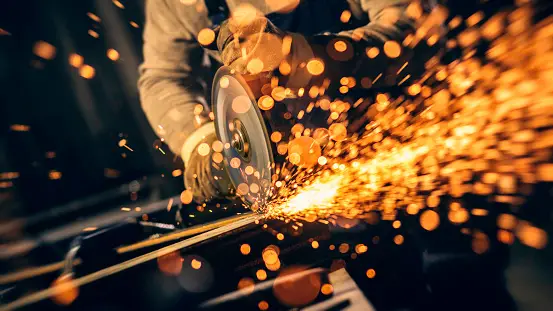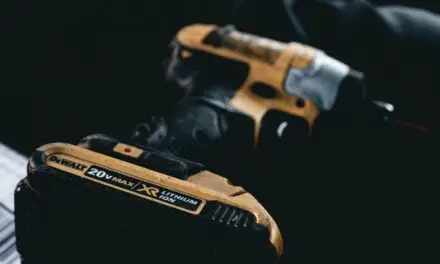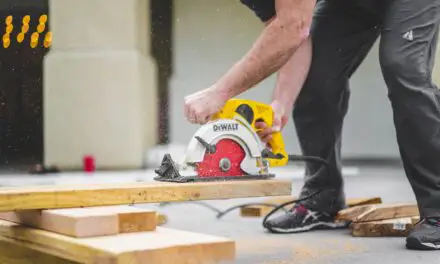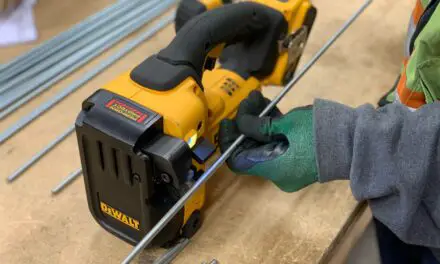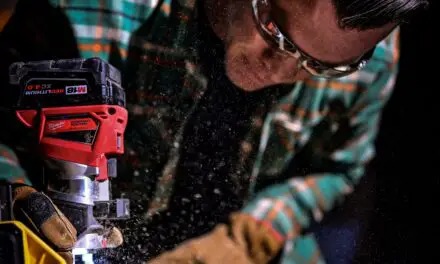A DeWalt miter saw is an excellent tool in your workshop due to its precision cuts and versatility with woodwork projects. The miter saw is your best choice when working with manufactured wood, composites, and crown molding. However, you might be curious to know if you can safely use your saw on other materials such as metals.
You can use a DeWalt miter saw to cut through some types of metal if you have the appropriate blade. The miter saw can fit various ferrous and non-ferrous blades to cut through thin aluminum and steel sheets. However, you can damage the tool, get uneven cuts, or hurt yourself.
Since the DeWalt miter saw is not ideal to use on metals, there are various considerations you should make to do it safely. Read on to learn about the metals you can safely cut, choose the best blade, and precautions to take when using the miter saw on metals.
Which Metals Can I Cut with A DeWalt Miter Saw?
While you are better off using the DeWalt miter saw on woodwork projects and purchasing a metal cutting saw, you may want to use it on metals occasionally. However, since your saw can get easily damaged, you should carefully choose the metals you cut.
If you equip your miter saw with a metal cutting blade, you can occasionally cut pieces of soft metals such as:
- Tin
- Thin sheets of aluminum
- Tungsten, cobalt
- Steel sheets.
On the other hand, if you want to chop thick metal pieces or often undertake large metal work projects, your DeWalt miter saw will not handle the load.
Ensure that you regulate the speed of your miter saw when cutting metal. The high speed of the DeWalt miter saw heats the metal due to the high friction. Additionally, the loose metal chips flying in different directions are dangerous.
Which Is the Best Blade to Use When Cutting Metals with A DeWalt Miter Saw?
You should use DeWalt saw blades only to cut wood and its composites, not heavy-duty materials such as metals. While working on metals with a miter saw is possible, you should use metal cutting blades to avoid damaging the saw and hurting yourself.
If you are wondering which is the best blade to use, here are some great options:
- Aluminum oxide blades: aluminum oxide is an abrasive material ideal for making precise cuts through metal bars and pipes. In addition, it’s durable and has a high heat resistance making it safer to use.
- Diamond blades: you can use a blade with synthetic diamond particles to cut through ferrous metals such as cast iron. However, it is not as durable as aluminum oxide blades.
- Carbide blades: if you want perfect cuts on ferrous and non-ferrous metal materials, carbide blades are the best choice. Additionally, it is durable and tough and will last a long time.
When choosing a metal cutting blade, you must consider the teeth per inch number. If you want precise cuts without damaging the metal, you should choose blades with more teeth. Blades with teeth per inch number higher than eight, depending on the thickness of the metal.
Additionally, buy metal cutting blades from reputable brands and consult an expert at your local tool shop if unsure about any modifications.
Will Cutting Metals Damage My DeWalt Miter Saw?
Ensure you use lubricants to absorb the heat when working on metals with your DeWalt miter saw. Similarly, reducing the speed of the blade reduces the amount of friction.
Here are some additional tips to protect your miter saw from damage and safely cut metals:
- Ensure that you wear personal protective gear such as eyeglasses, gloves, and ear muffs. Cutting metals produces heat and flying sharp shards that can injure you.
- Support and secure the metal firmly with vice adjusters and locks to ensure you hold it tightly. A loose metal is dangerous, and you might damage it.
- Check the condition and position of your saw and guard before switching it on. Keep all cables away from the cutting area.
Now you know everything about using a DeWalt miter saw to cut metal.
In Conclusion
DeWalt miter saws are handy when making precise cuts when working with wood. While we recommend that you use miter saws on just wood, you can modify the blade and cut metals when needed. However, remember that the tool will not work as efficiently on other materials as on wood.
If you use your miter saw on metals, ensure you choose the best blade and use lubrication to prevent damage from friction. Additionally, following the precautions discussed above will ensure safety, prevent damage to the metal, and maintain tool efficiency.

